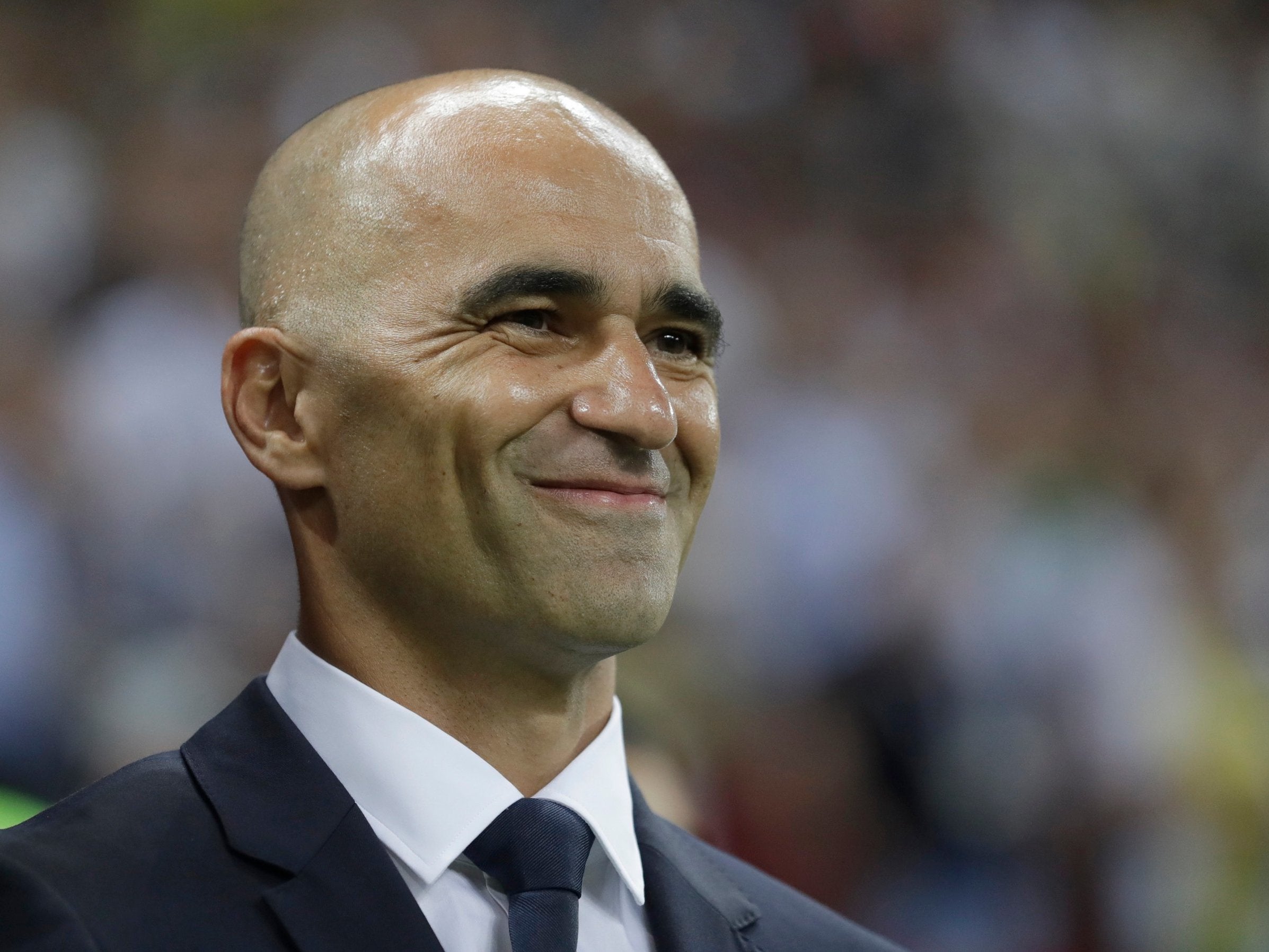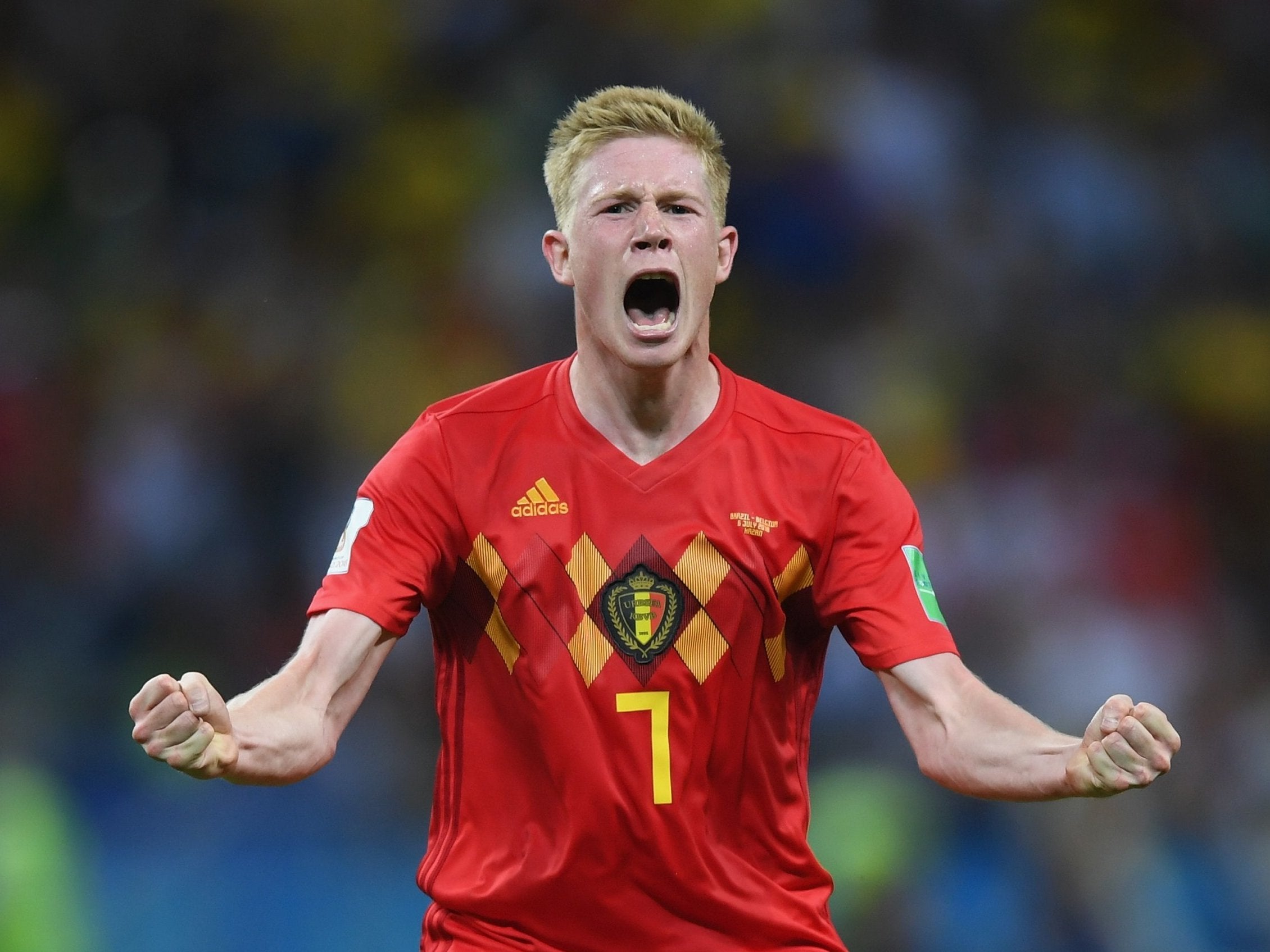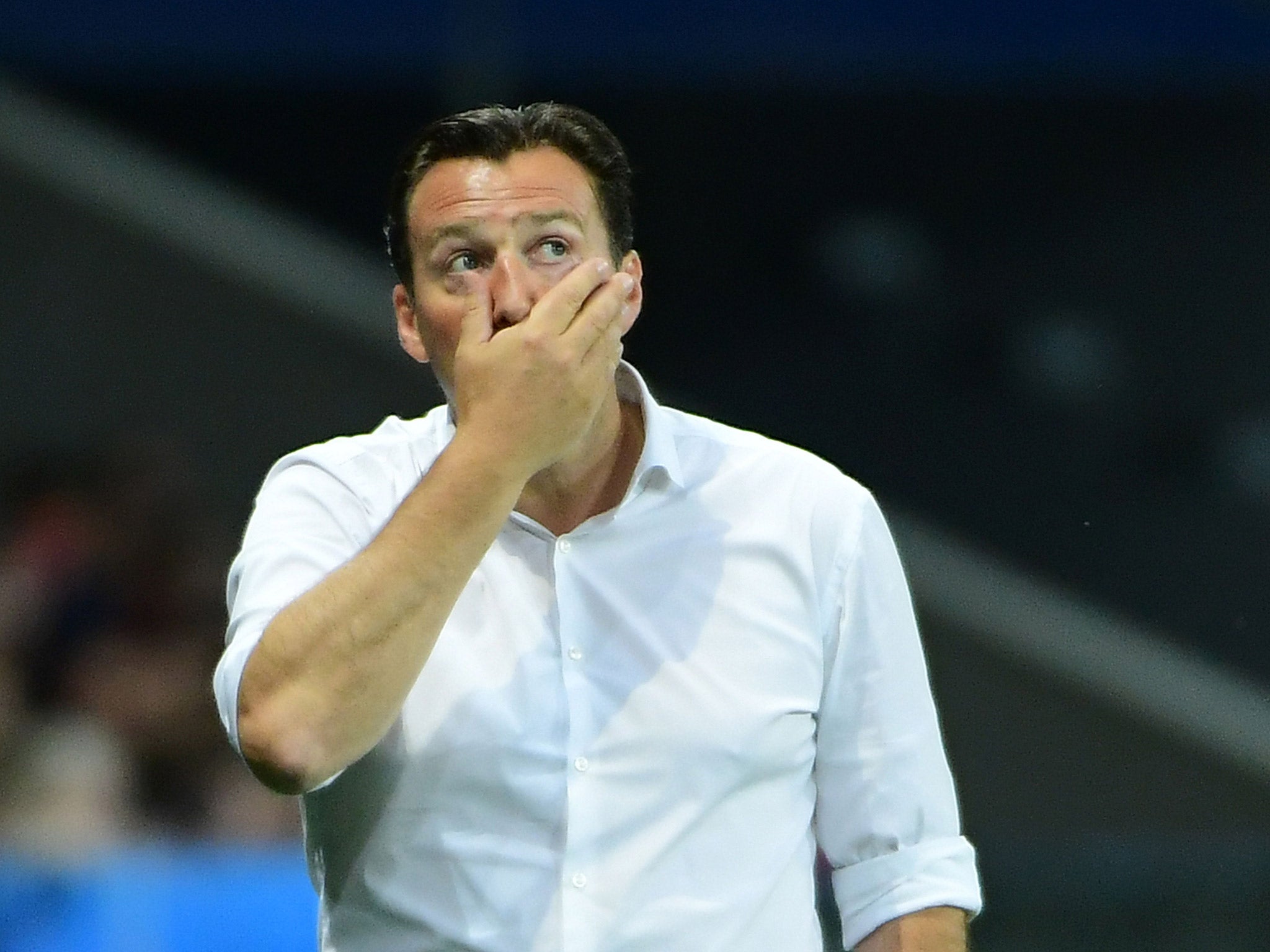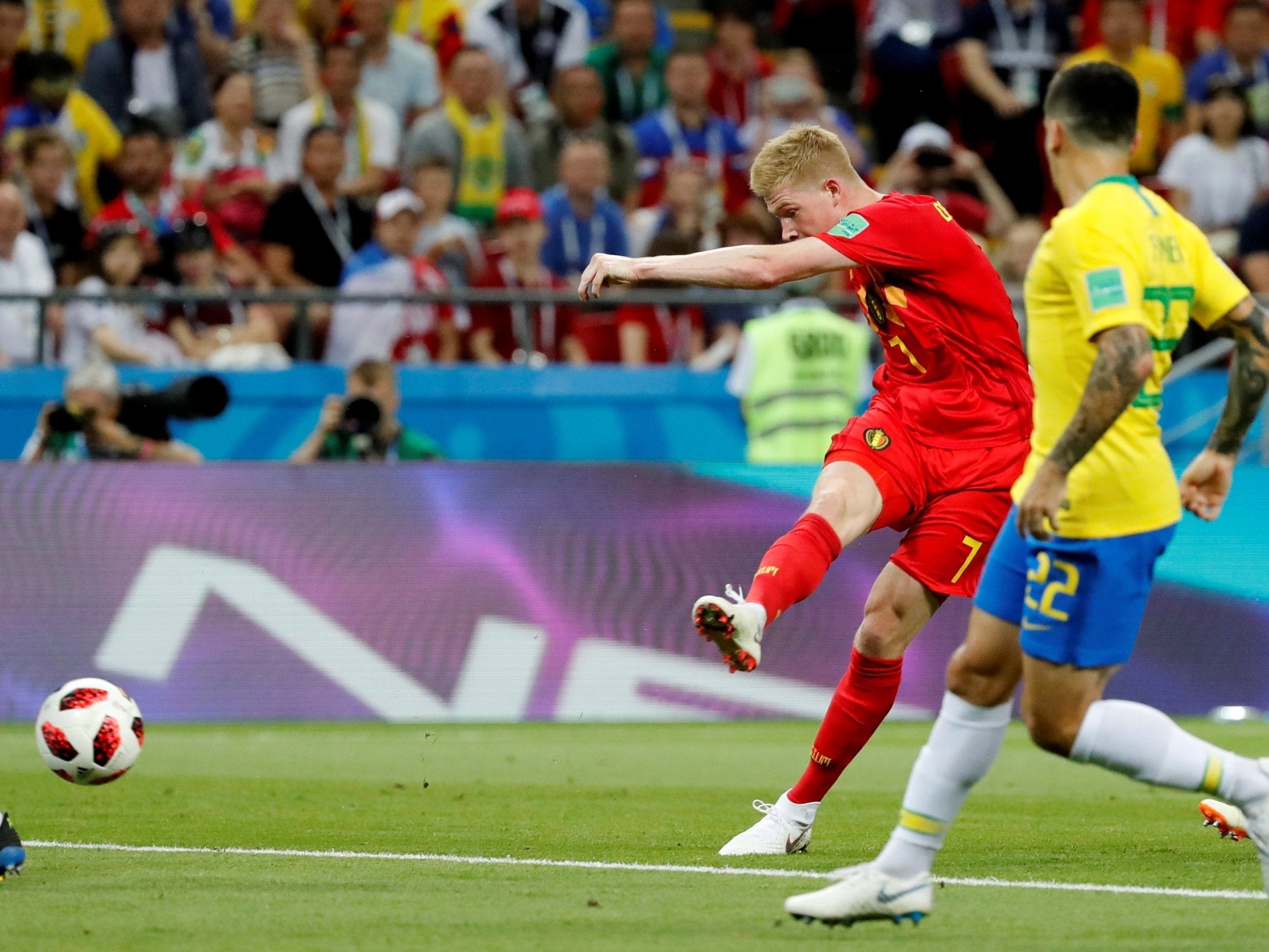World Cup 2018: Belgium’s Roberto Martinez gamble pays off as big-name players start pulling in same direction
After booking their place in the World Cup semi-finals for the first time, it was clear to see that Belgium’s players are starting to buy in to the Martinez way

Your support helps us to tell the story
From reproductive rights to climate change to Big Tech, The Independent is on the ground when the story is developing. Whether it's investigating the financials of Elon Musk's pro-Trump PAC or producing our latest documentary, 'The A Word', which shines a light on the American women fighting for reproductive rights, we know how important it is to parse out the facts from the messaging.
At such a critical moment in US history, we need reporters on the ground. Your donation allows us to keep sending journalists to speak to both sides of the story.
The Independent is trusted by Americans across the entire political spectrum. And unlike many other quality news outlets, we choose not to lock Americans out of our reporting and analysis with paywalls. We believe quality journalism should be available to everyone, paid for by those who can afford it.
Your support makes all the difference.Last November, Belgium hosted Mexico in a friendly in Brussels. Pinned back in their own half for large parts of the game and without any clear blueprint for controlling possession, Belgium twice trailed in the second half before pegging Mexico back to claim a 3-3 draw. But nobody at the King Baudouin Stadium that night was entertaining any ideas that they were watching potential World Cup winners.
Afterwards, midfielder Kevin de Bruyne was strongly critical of the team’s tactics. Cast adrift in the centre of midfield, starved of the ball and thus forced to chase it all over the pitch in the absence of an effective press, the failure to get the best out of De Bruyne’s many talents seemed to encapsulate Belgium’s inefficiency, its profligacy, its essential banality. An exasperated De Bruyne was certainly in no mood to pull punches.
“Mexico were just tactically better,” he said. “Their system made our five defenders sit deep, and we were swimming in midfield. Look, we still put too much on our talents. Of course we play with a system that is in principle very defensive, but it is filled with many attacking players who want the ball. As long as we don't have a good tactical system, we will have difficulties against countries like Mexico.”
De Bruyne’s criticisms were widely regarded as a broadside against coach Roberto Martinez, but in reality he had pinpointed with his usual surgical precision a flaw that had bedevilled Belgium ever since it became clear that they were cultivating a generation of abundant and unprecedented individual talents. Getting them all on the pitch was easy enough. Getting them to pull in the same direction, as a functioning unit, was another thing entirely.
On a still night in Kazan, Belgium finally discovered their Arcadia. In defeating Brazil 2-1 to reach their first World Cup semi-final in 32 years, they produced what has eluded them for so long: a genuine team performance, in which the various parts of the machine worked in harmony, not in isolation. The flanks were connected to the centre. The defence was in tune with the midfield. There actually was a midfield, which made a nice change. Once the ball reached the front three of De Bruyne, Romelu Lukaku and Eden Hazard, anything was possible. And with France awaiting in Tuesday’s semi-final in St Petersburg, anything still is.
So what had happened in the intervening eight months? In the aftermath of the game plenty of praise was strewn in the direction of Martinez, whose shapeshifting 3-4-3 system – which morphed into a 4-3-3 when out of possession – went a long way to blunting Brazil’s most creative players. The coach himself was keen to deflect the credit: “I never lost a game on the tactics board, it’s the execution that matters,” he said. What’s undeniable, though, is that for the first time in years, the players are buying into the Martinez way.
“We were so organised collectively,” said right-back-slash-right-wing-back Thomas Meunier, who did a superb job shackling the triple threat of Neymar, Philippe Coutinho and Marcelo on the Brazil left. “I always had help from Marouane Fellaini, from Toby Alderweireld. We were really focused on Neymar, on Coutinho, on Marcelo, and we really did a wonderful job.” Goalkeeper Thibaut Courtois was similarly effusive. “Our tactical plan,” he said, “was perfect.”
Of course, this isn’t the sort of thing you can create overnight. And in many ways, it has taken most of Martinez’s two years in charge to finally instil a culture in which players are challenged, coached rather than managed, given the tools to solve problems on the pitch. To understand the journey Belgium have been on, you need to go right back to the dying throes of the previous regime, at Euro 2016 under the well-meaning but tactically trouserless Marc Wilmots.

Perhaps the anecdote that best sums up the Wilmots regime is that four days in advance of their quarter-final against Wales, the team’s video analyst Herman de Landtsheer compiled a report on the Welsh threat at set pieces, in which – much like England under Gareth Southgate at this World Cup – four players gathered in a tight knot on the edge of the area before scattering in all directions. But remarkably, not once did Wilmots practise defending against the tactic in training. Shortly before half-time, Ashley Williams equalised from just such a routine, and within an hour a 1-0 lead had disintegrated into a humiliating 3-1 defeat.
As Belgium’s tournament leaked away, Wilmots proved utterly incapable of turning the tide. His big idea was to replace Yannick Carrasco with Marouane Fellaini, and urging his players to show “more aggression, that’s all”. Of perhaps greater importance was the fact that the defence of Meunier, Alderweireld and Jason Denayer were not informed of the line-up until three hours before kick-off, and had reportedly not played a single training session together.

And so when Wilmots was sacked and Martinez brought in, his job was not simply to get a team onto the park, but to unpick an entire cycle of neglect. Whereas Wilmots often seemed unwilling or unable to stir or confront the star names in the team, what Martinez eventually realised was that this was a group that actually wanted to be challenged. These are, after all, intelligent players used to working under the some of the world’s most demanding and exhaustive coaches: Pep Guardiola, Jose Mourinho, Diego Simeone, Maurizio Sarri, Antonio Conte, Mauricio Pochettino, Unai Emery. Martinez’s strategy has thus been to load them with detail and trust them to take it all in, to find the right solutions, to strike the right balance between attack and defence.
Martinez takes opposition research extremely seriously, and builds training sessions around it. The plan for the Brazil game, specifically calibrated to curb the threat of Marcelo and move the ball into the channels where Brazil were light on numbers, was drilled in closed training sessions for two whole days – another point of difference with Wilmots, who preferred his training sessions to be open and rarely adjusted them for a particular opponent.
“Every coach has his approach,” said Alderweireld. “Now, we analyse the opponent’s matches to work out how to exploit their weaknesses. We work frequently on tactics, and these closed sessions give us more peace. We had a good plan, we knew what to do – that’s one thing. The second thing is to actually do it. Then it’s all about heart, and defending well.”

Martinez’s tactical focus has also allowed Belgium to develop different strategies based on the match situation. De Bruyne has been deployed in a deeper midfield role for most of the tournament, but as Belgium tried to chase down a 2-0 deficit against Japan, he was pushed further forward in an attempt to stimulate their transitions. It was a role he reprised spectacularly against Brazil, scoring a memorable breakaway goal just 17 seconds after defending a corner in their own penalty area. “It is our strength that we have different plans,” Alderweireld said. “This was the first game we sat back a little and tried to play the counter.”
And as Belgium have rolled ominously towards their first World Cup semi-final since 1986, a united country has begun to coalesce behind a united team. Although the appointment of Martinez initially raised eyebrows – “the choice of a foreigner surprised me,” observed Wilmots, who appeared not to notice the irony in his most recent job being coach of Ivory Coast – it looks in hindsight like a subtly shrewd decision, neatly reconciling the French and Dutch-speaking divide that has frequently riven the country’s politics and cultural life, as well as its football.
Martinez’s achievement has been to lash together a squad of many different identities – Flemish and Walloon, indigenous and immigrant, young and experienced – whilst persuading his superstars to submit to a common cause. The team’s social media hashtag is #redtogether, and it was telling that in the immediate aftermath of the win over Brazil, Meunier tweeted: “The collective will always take priority over the individual.” The former Tottenham and Barcelona striker Steve Archibald famously observed that team spirit is an illusion glimpsed in the aftermath of victory. But when you have a World Cup semi-final to prepare for, the question of whether success has driven cohesion, or the other way round, is not exactly one this side are going to lose sleep over.

Meunier, who will be suspended for the semi-final after picking up his second booking of the tournament, believes France will be an even tougher test than Brazil. “They have a really good balance, defensively, offensively,” he said. “I think France is a bit more complete than Brazil,” Jan Vertonghen agreed. “It’ll be harder to break them down.”
But after decades of underachievement, followed by the biggest win in its history, Belgium can finally believe. With every multiple World Cup winner now out of the tournament – Brazil, Germany, Argentina, Uruguay, and Italy failing even to qualify – the feeling is that the time is ripe for a new name on the trophy, for new history to be written, for a new footballing power to assert itself. “What this country has achieved at a football level is unique,” said captain Vincent Kompany in the afterglow of victory. “But we need to carry on. It is not the end.”
Join our commenting forum
Join thought-provoking conversations, follow other Independent readers and see their replies
Comments